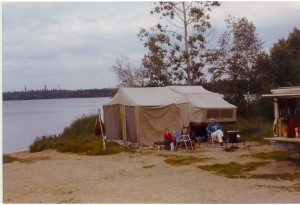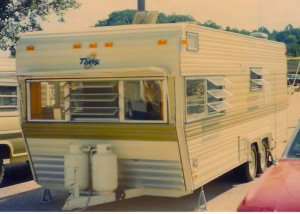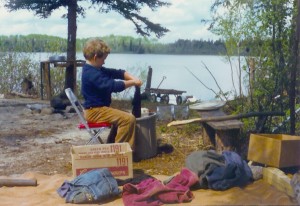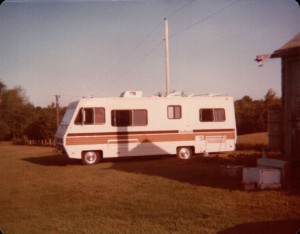I like campy things.
That does in fact include the 1960s version of Batman that starred Adam West. But that’s not the type of campy I’m talking about.
The other campy.
The picture in your head right now is probably the correct one, but how do I know that? How does one convey what “campy” stuff is? I think we more or less know it when we see it, but how do you define it?
Since I was a little person with curly hair, I’ve been fascinated by the natural space under the clouds, hatchets, campfires, knives, guns, tents, hiking, chopping wood, cooking over a fire, etc.
Campy stuff, you see.
But what, precisely, is camping?
It’s different things to different people. And over the past short while I’ve read the journals of Lewis and Clark Clark as well as a biography of Daniel Boone which informed me of the idea that the definition changes over time.
The stories about these historic characters got me thinking more about a definition for camping.
My parents, my dad specifically, were camping people. My earliest memory of camping is of a trip to Canada to a place called Bouchard Lake. My folks borrowed a weary old pop-up trailer for the trip.
Bouchard Lake was located on an old logging road that had years before been retired. There were numerous rivers and streams on the route, each traversed by use of a hand-made log bridge.
Our camp was dozens of miles from anything. It was remote and baren. We fished for walleye and lived off the land to a great degree.
And the mosquitoes, they lived off us.
It was dirty and it was basic. But that of course is relative. We had a Ford pickup truck, the aforementioned pop-up camper, sleeping bags, a Coleman gas stove, a Coleman gas lantern, fishing rods and reels, bait, axes, aluminum camp chairs and toilet paper.
Basic compared to our home life at the time, but basic compared to humans in the wilds a few hundred years prior? I suspect we were in such a state of luxury that in prior eons we could have sold passage to our little camp for many valuable trinkets.

Our camp, around 1972, on the shore of Bouchard Lake.Your author, playing the part of wilderness pioneer.
My memories of that particular trip are vague. I remember the mosquitoes and some minor details, but I have comfy places in my mind about the trip.
But more comfort was desired by the family. And a longer stay was planned (my mom was a teacher and thus had summers off, my dad was retired). Before the summer of 1973 we had purchased a self-contained travel trailer. The camper, a 23-foot Terry, had a furnace, refrigerator, freezer, toilet, shower as well as the implied shelter and protection such a construction affords. The beers of deeper Canada could probably still have snacked on us, but I felt invincible. We had a fort on wheels!
We camped with the Terry for several years. I’m not sure what made it “camping,” though. We were away from home. But we had running water, heat and as a rare treat, homemade cinnamon rolls made by my dad in the camper’s gas oven.
During many summers we’d spend months in Canada, at our preferred location of Atikameg Lake. Atikameg Lake was more remote than Bouchard, on the same series of logging roads, but more people knew about it so while we were more isolated from civilization (about 25 miles), we often had the company of like-minded campers.
We were without doubt we had the most advanced camp. By that point we had large, industrial size LP gas bottles to keep the fridge going, benches made for comfortable fire-watching, wildlife feeders and a large tarp laid beside the trailer to keep dirt out of the “fortress.” We bathed in the lake and used the camper’s toilet only for middle-of-the-night necessities.
We had pretty sophisticated equipment, but we were remote and camping.
We had many modern tools to make our time in the woods more efficient and comfortable. Once in a while we’d spend most of the day to make a trip by truck to the junction of the logging road and Canada’s Highway 17. We went to a place called the White Lake Lodge. There we would get milk, soft drinks and other camp supplies. We’d finish the supply run with an ice cream cone and then head back to camp.
I learned a lot of “camp skills” during those years. Even though we had fancy rigid shelter, my dad, other campers and Canadian Indians, taught me how to cut wood, how to make a fire, how to catch and clean fish, how to throw an axe, how to make a lean-to, etc. I treasure those skills. Whenever I watch one of the overly-dramatized programs on TV about surviving in the wilds I think to myself “I probably don’t want to do that…but I think I could.” And it’s camping that did that for me.
In 1978 my parents decided that we needed to see more of North America apart from Canada. We loved Canada, but wanted something differnt. The decision was made that something simpler was required.
With a pickup truck and travel trailer you have the hitching, un-hitching, leveling, backing, etc. that add to the hassle of making a foray. So my parents decided that a motorhome would be the next fortress on wheels for us.
They purchased a Southwind motorhome. This unit had many of the same capabilities as the Terry, though it added air conditioning to the mix and a higher level of luxury. This was not the vehicle for deep woods affairs — we would stick to improved campgrounds that catered to rigs of this size.
We spent a few years being campy with the motorhome but one thing and another (not the least of which was that this rig was a lemon — pits, peels and pulp), we bought our old Terry travel trailer back.
We did a little more camping, but with my dad’s declining health, trips became rare.
I still had that cowboy giddyup in my craw, so when I was a teenager I took my lawn mowing money and ordered an 8×10 tent from the Montgomery Ward catalog. I was ready to pack it all up and hit the deepest reaches of the frontier!
I was too young and stupid to realize that the frontier didn’t have NBC or CBS.
My final camp outing came when I was about 15 years old. The youth group at church, egged on by our “adult” leaders Tony and Rick, decided the boys should go camping for a weekend. We were to do some fire-building, some fishing, some shooting of guns and conduct some general teenage boy craziness in the woods. And me, having such a great tent, camping experience and firearms was all for it.
Ah, but did I mention that this trip was slated for February? In Michigan? With overnight lows of about 10 below zero? And that the fishing would be ice fishing?
Hindsight, baby, it’s a trip.
Well, I won’t bore you with the details of that outing, suffice to say that a nylon tent, when subjected to temperatures below zero, gets brittle, cracks and for all intents and purposes goes “Poof!” into a bajillion little flakes of worthless confetti.
So that was the end of my tent.
And the end of camping for this author.
Until I met the woman I would later marry. A couple of years ago, before we were even dating, we decided to go camping together. I bought a little one-person pup tent for myself since she already had a small tent and assorted gear herself.
It was great to get back out there! I found that all of my camp skills were still with me. I could still pitch a tent, cut wood, make a fire and cook a decent dinner over the flames. We sat around our campfire until the hours of the next morning: watching the snap and pop of the fire, crying the smoke out of our eyes and watching the dark, dark sky.
Since then we’ve camped a few more times and are now, in the footsteps of my parents, looking at travel trailers. We want more of course. We’re good Americans.
There’s also something about camp food. I suspect hot dogs, hamburgers and marshmallows are pretty standard camp fare. But camp food can vary based upon your experience. My wife, for example, used to camp with a group whose tradition was to construct a ginormous pot of stew, with everyone providing ingredients for the cauldron. While a tradition for my family was Wyler’s Instant Lemon Aid. Oh how I hated that foul fluid!
So, throughout my career as a human, I’ve had many adventures that I classify as some type of camping. But what, exactly, IS camping and why is it so restorative and good?
On our most recent trip beneath the trees I decided, regardless of how many conveniences you have, it’s being close to nature that does the job. At least for me.
Being “close to nature” is probably a cliche, but it’s apt. When I spend concerted time getting soil lodged beneath my finger nails and make fire, I contemplate my life and place in the world. The stunning beauty of God’s hand, close and personal for a day or two, brings me peace and recharge.
At any point in history people have had certain tools and skills available for living beneath the canopy of sky and trees. They’ve used them to their best advantage. We do the same. In a few hundred years I suspect that people will still “camp”. They’ll just get to the site with a jet pack and their shelter will spring from a disk that has been sprinkled with magic water.
The smoke will still get in their eyes, no matter where they sit.



